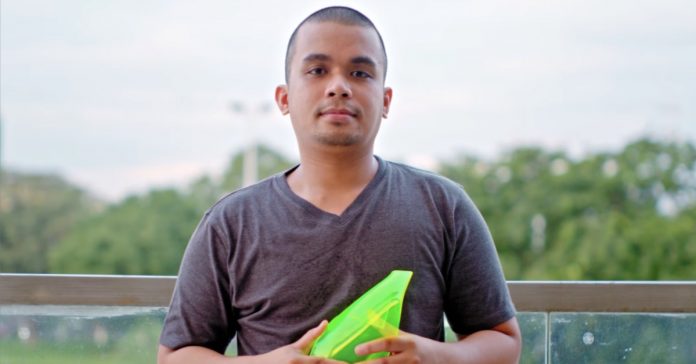A new material called AuREUS made from rotting vegetables that can produce renewable electricity was among the 2020 James Dyson Award winners.
For the first time, the James Dyson Award judges announced two winners of the competition. The award is open to young inventors across the world who have created devices or concepts that could make a positive difference to the planet.
The winner of the inaugural sustainability award was named as Carvey Ehren Maigue from Mapua University in Manila in the Philippines. With the aim of addressing shortcomings in solar energy production – such as poor environmental conditions – Maigue developed a new material called AuREUS.
It can be attached to a pre-existing structure or surface to harvest UV light and convert this into visible light to generate electricity, regardless of whether it’s cloudy. The particles in his material absorb UV light causing them to glow.
While ‘resting’, the particles remove excess energy, which bleeds out of the material as visible light and can be transformed into electricity. To boost the material’s sustainability further, Maigue made it from a substrate extracted from waste crops. This makes it durable, translucent and mouldable.
“Winning the James Dyson Award is both a beginning and an end. It marked the end of years of doubting whether my idea would find global relevance,” Maigue said.
“It marks the beginning of the journey of finally bringing AuREUS System Technology to the world. I want to create a better form of renewable energy that uses the world’s natural resources, is close to people’s lives, forging achievable paths and rallying towards a sustainable and regenerative future.”
Commenting on his invention, Dyson said that, as a farmer himself, he sees “great potential” in the technology.
“His bright idea to use upcycled crop waste develops a closed-loop system,” he said. “This element of his invention is particularly clever and shows the close link between farming and technology.”
International winner
The overall international winner was named as Judit Giró Benet from Tarragona in Spain who developed The Blue Box. After discovering that as many as 40pc of women skip their breast cancer screening mammogram – some of who say is due to pain it causes – Benet created an at-home, biomedical breast cancer testing device that uses a urine sample and an AI algorithm to detect early signs of breast cancer.
Once a urine sample is produced and inserted into The Blue Box, the machine performs a chemical analysis of the sample and sends the results to the cloud. The AI reacts to specific metabolites in the urine and, in testing so far, has produced a classification rate of more than 95pc.
Commenting on her award, Benet said: “The Blue Box endeavours to change the way society fights breast cancer and to give all women in the world the chance to avoid an advanced diagnosis, making screening a part of our daily lives.
“The prize money will allow us to patent more extensively, expediate research and development and help to ensure our product is viable.”
Among the 18 finalists to miss out on the top prize was Irish student Niamh Damery of the University of Limerick who invented the Econooc, a hive made for wild native Irish black bees.
It bio-mimics the space in a hollow tree from mycelium and other repurposed and sustainable materials. This hive and calendar allows for anyone to have bees in their garden, while also teaching them about biodiversity.





























